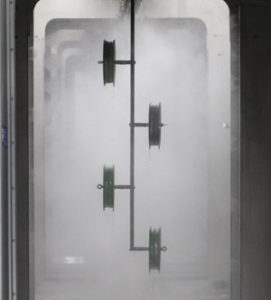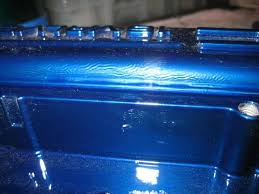What Part Does Water Quality Play in Pretreatment?
 Water may be the most important component in the pretreatment process. 95% or more of the pretreatment process chemistry is water. It is important to give some thought to water’s contribution in your pretreatment operation.
Water may be the most important component in the pretreatment process. 95% or more of the pretreatment process chemistry is water. It is important to give some thought to water’s contribution in your pretreatment operation.
The primary role of water is to remove chemical/soil residue and contaminants from the work area, providing a contaminant free surface for optimum coating adhesion and performance. Therefore, water quality is critical to achieve your customers specified coating performance standards.
Directly related to your water quality are the impurities or contaminants that your water contains. One major problem area in the pretreatment process is high TDS (total dissolved solids) accumulating in the rinse water, and being deposited on metal parts during rinsing. When the water evaporates, these impurities are left behind. PH balance also needs to be maintained. Generally, the closer the PH is to neutral (7) and the lower the TDS, is when you achieve the best water quality.
Poor water quality results in:
- adhesion failure
- rust
- warranty claims
- excessive water treatment costs
- environmental compliance issues
Good water quality is an extremely important key to your pretreatment process, and should be monitored and controlled routinely, efficiently and effectively.
Related posts
Search this blog
Get email updates
Archives
- April 2024
- August 2023
- May 2023
- April 2023
- March 2023
- June 2022
- May 2022
- April 2022
- November 2021
- October 2021
- September 2021
- April 2021
- March 2021
- January 2021
- October 2020
- August 2020
- June 2020
- May 2020
- February 2020
- January 2020
- December 2019
- October 2019
- September 2019
- June 2019
- May 2019
- March 2019
- February 2019
- October 2018
- September 2018
- August 2018
- July 2018
- June 2018
- May 2018
- April 2018
- March 2018
- July 2017
- June 2017
- May 2017
- April 2017
- March 2017
- February 2017
- December 2016
- June 2016
- May 2016
- April 2016
- February 2016
- January 2016
- September 2015
- June 2015
- March 2015
- February 2015
- January 2015
- December 2014
- November 2014
- August 2014
- June 2014
- May 2014
- April 2014
- August 2013
- July 2013
- March 2013
- October 2012
- September 2012
- March 2011
- February 2011
- January 2011
- October 2010


